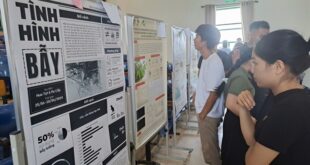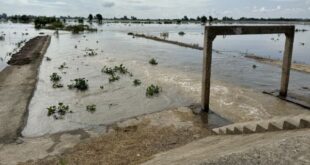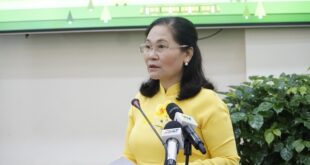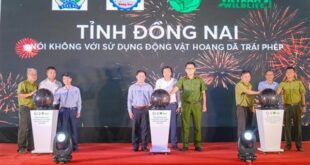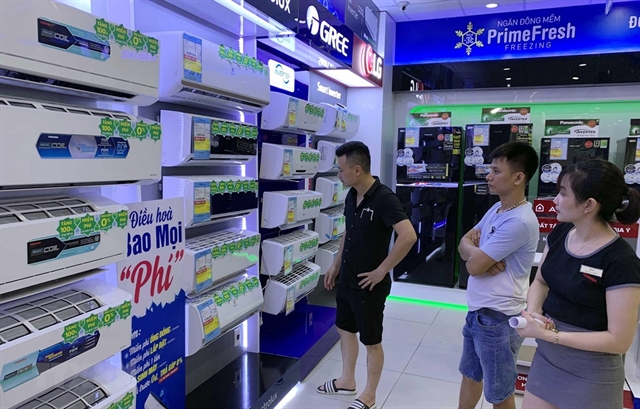 |
| People shop for air conditioners at an electronics supermarket in the northern province of Hưng Yên.—VNA/VNS Photo Phạm Kiên |
HÀ NỘI — Việt Nam is recommended to regulate minimum energy performance standard (MEPS) for air conditioners’ seasonal energy efficiency ratio, chillers, variable refrigerant flow, and cars’ mobile air-conditioning systems in the country’s National Green Cooling Programme.
Besides, the country should also switch to greener refrigerants such as R290 or R717, enforce and comply with policies through robust monitoring and verification, Anant Shukla, expert of the Consultancy Consortium, said at a consultation workshop held on Tuesday in Hà Nội.
The workshop was co-organised by the Department of Climate Change under the Ministry of Natural Resources and Environment and the Southeast Asia Energy Transition Partnership to provide technical assistance for the project “In-depth study and survey to develop the National Green Cooling Programme”.
The country was also advised to raise awareness and build capacity for human resources; conduct research and development on innovative technology as well as international collaboration under the national green cooling programme.
According to the department, the main objective of the technical assistance is to conduct an in-depth study and survey to assess the current state of the cooling sector in Việt Nam, including the available technology, market status, and to stocktake both international and national policies.
Based on the analysis, proposals will be made to develop the national green cooling programme to promote conversion to high energy efficiency and low carbon technologies, and increase energy savings in the cooling sector.
Cooling demand rises
Nguyễn Bá Tú, of the department’s Greenhouse Gas Emissions and Ozone Layer Protection Office, said Việt Nam was experiencing rapid urbanisation and economic growth, leading to increasing demand for cooling.
However, the cooling sector was a major source of energy consumption and greenhouse gas emissions, he said.
Therefore, the Government was developing a National Green Cooling Action Plan (NGCAP) to address these challenges, he said.
Nguyễn Tiến Hải, technical expert of the Consulting Consortium, said data from the Việt Nam’s Energy and Environment Consultancy Joint Stock Company (VNECC) at the workshop showed that the annual growth rate of the country’s cooling sector was 2.3 per cent between 2018 and 2022.
The annual growth of residential and commercial air conditioners reached 7.6 per cent between 2018 and 2022. The number of annually-consumed air conditioners increased from 5.4 million to 5.9 million between 2018 and 2022, according to the VNECC.
The total number of air-conditioners reached over 20.72 million in the country in 2022. The number is expected to continuously rise and reach 75 million in 2050 with an increasing cooling demand for homes, hotels and various small to medium-sized cooled spaces.
The total GHG emissions of the cooling sector was 59.98 metric tonnes of carbon dioxide equivalent (MTCO2e) in 2022.
Residential and commercial air conditioners account for 36.1 per cent of the total emission, while central air conditioners and chillers account for 17.6 per cent of the total.
Because the air conditioner market was growing rapidly and sales were expected to continue increasing in the future, emissions from residential and commercial air conditioners would hold its position as the top emission subsector until 2050, Hải said.
The cooling sector is a major energy consumption sector in 2022, accounting for 25.1 per cent of the total energy consumption of the country.
The project is one of the major activities within the framework of energy transition cooperation and greenhouse gas emission reduction between Việt Nam and the Southeast Asia Energy Transition Partnership, as stated in the Memorandum of Understanding between the Department of Climate Change and the United Nations Office of Project Services (UNOPS) on June 21, 2022.
The project is expected to be carried out over 12 months, from February 2023 to February 2024.
The Southeast Asia Energy Transition Partnership has mobilised a consortium led by VNECC along with Perspectives Climate Group GmbH (Germany) and EPRO Consulting Joint Stock Company (Việt Nam), to provide consulting services for the project. — VNS
- Reduce Hair Loss with PURA D’OR Gold Label Shampoo
- Castor Oil Has Made a “Huge” Difference With Hair and Brow Growth
- Excessive hair loss in men: Signs of illness that cannot be subjective
- Dịch Vụ SEO Website ở Los Angeles, CA: đưa trang web doanh nghiệp bạn lên top Google
- Nails Salon Sierra Madre
 VnExpress News The News Gateway of Vietnam
VnExpress News The News Gateway of Vietnam
